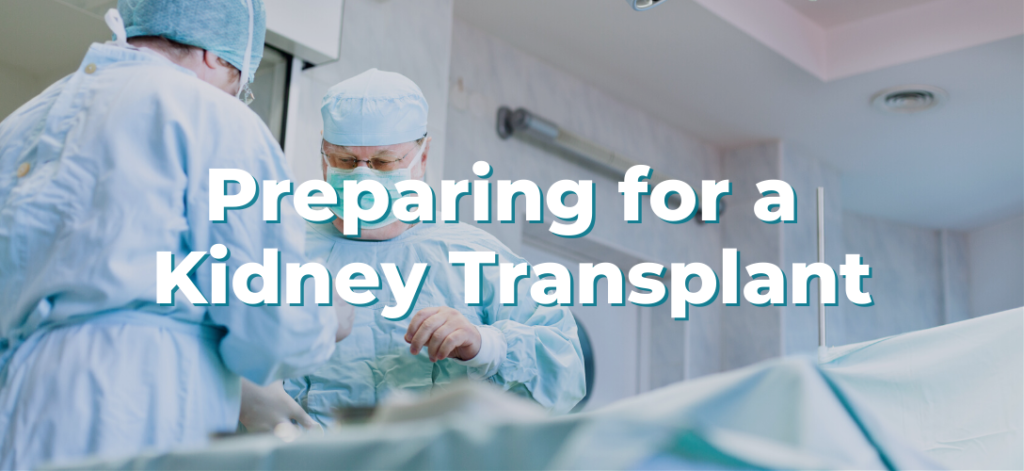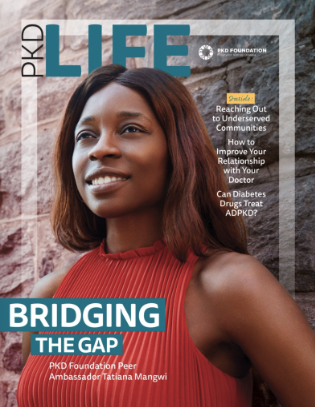
Published on January 17, 2023 | If you have PKD, your nephrology team may one day recommend that you be evaluated for a kidney transplant. Here’s what New Orleans nephrologists Zohreh Soltani, M.D., of Ochsner Medical Center, and Siddhartha Bajracharya, M.D., of University Medical Center, recommend you do beforehand to get the best possible outcome.
Don’t wait until you need a transplant to start thinking about it
About 60% of people with PKD will have kidney failure by age 70. The earlier you get a transplant, the better the result. Start getting your affairs organized before you get to renal failure. Line up a living donor just in case, make sure you have a support system for at-home care after surgery, and get your finances and health insurance in order so that if or when that day comes, you’ll be ready for action.
Go for screening tests
Once the referral is made, you will be directed to a transplant program. Then you’ll be seen by a surgeon, nephrology pharmacists, a social worker, a financial counselor, and transplant coordinators. Not only will you get a comprehensive medical evaluation, but the team will also check to see that you have appropriate financial backing, that you are psychologically prepared (good medication and followup care compliance), and that you have solid care support at home. After that, the selection committee will meet to determine whether you are a good candidate.
Don’t despair if you’re turned down
Patients are not good candidates if there’s an absolute contraindication for transplant such as active infection, untreated malignancy, active substance abuse, documented noncompliance with medications, or insufficient social support. “However, if they resolve all the contraindications over time, the patient can be reconsidered for transplant,” Dr. Soltani says.
Look for a living donor
“Most transplant physicians prefer living donors whenever possible, as that kidney typically will last longer,” says Dr. Bajracharya. Also, there’s a nationwide shortage of donations from deceased donors, which can make the wait time up to seven years. Your living donor will have to go through the same screening process to ensure that they are a match and suitable for donation. Don’t give up if no one you contact is a match. You may be eligible for a living donor paired exchange (your donor gives to a stranger, and that stranger’s donor gives to you) or a Never Ending Altruistic Donor (NEAD) chain, which is when an altruistic non-directed donor steps in to donate a kidney and begins a chain of kidney transplants. A living donor, or donors, are willing to donate to someone waiting for a kidney, but they’re incompatible with their intended recipient and agree to donate to someone else also waiting for a kidney transplant.
Register for a deceased donor if you don’t have a living donor
In the United States, most kidney transplants come from deceased kidney donors. Donor organs are matched to waiting recipients through a national registry called the Organ Procurement and Transplantation Network (OPTN). This registry is operated by the United Network for Organ Sharing (UNOS). Your team will guide you through the process, but you can also learn more here.
Common Myths About Kidney Transplants
- Transplants are a cure: For as long as you have a transplanted kidney, you will have to take medications and follow up with your nephrologist. PKD impacts more than the kidneys, the risk of liver cysts or cerebral aneurysm still exist.
- You’ll only need one transplant in your life: The average transplant lasts 10-12 years. Depending on your age, you may have to have more than one.
- You can’t get a transplant because you’re not on dialysis: Physicians prefer that patients get a preemptive transplant, if possible.
More than 100,000 people are waiting for a kidney transplant in the United States. It’s important to educate yourself and your family about transplantation as early as possible to be prepared.
 Want to see more articles like this? Read the full issue of our magazine, PKD Life, and subscribe to future issues here.
Want to see more articles like this? Read the full issue of our magazine, PKD Life, and subscribe to future issues here.









There is so much more to talk about than what this blog suggests. I recommend talking with people who have had transplants recently, like myself, or joining the Seattle Chapter monthly virtual chat. You can register for free on the Seattle Chapter page
I’m currently doing dialysis and waiting for the word that I am on the transplant list.
I agree with another commenter: there is a great deal more to be aware of with a kidney transplant. One will have to take medications, but what is not mentioned is the type and substantial number of medications necessary to take for the rest of your life! Due to the medications, your immune system will be compromised and you’ll be open to infection and more. Transplant and dialysis are not cures. I like to call them band-aids but even a band-aid is just temporary. These two procedures are not temporary. I am currently at Stage IV/V with a eGFR lower than 20, which means I need to not only start thinking about dialysis or transplant, but I need to choose what I want my end result to be. Frankly, as with others, I don’t want either procedure, especially while my one remaining kidney still functions and we don’t know how long it will function: days, weeks, months, years? I can’t see giving up my still functioning kidney and take on a transplanted kidney with all the new problems and issues that go along with it. It is not an easy decision to make. I’m scared either way. I admire and respect those who had a transplant. I’m curious if they all took the preemptive transplant or took it because they “had” to. It is difficult to locate those people who have had transplants. The few I did speak with said that if they knew all that was involved after the transplant, they wouldn’t have had it done. Any comments?? Thanks in advance. Stay safe.
Frances, my husband had a deceased donor transplant at 43. I’m happy to discuss your questions.
This article doesn’t mention the value of a transplant chain. People are willing to donate but are not a match, may be a match for someone else who has willing donors that are not a match them.
This happened to me, my potential donor was not a match for me, but he was a match person, who’s potential donor was a match for me!
Recovery was slower than expected but now I feel great. Working full time with energy to spare!
Our twins inherited PKD. They had to have both kidneys removed due to size. No decision if to do dialysis, obviously. Five days ago the “younger” twin got a kidney after being on the list for over 6 years. We were surprised it took 4 days for kidney to function at all-minimal output currently. (The “older” twin has had his transplanted kidney just over 5 years; is doing ok, with the handful of meds and good follow=up.) Lara’s suggestions are good. Frances’ review re: meds is essential to know.